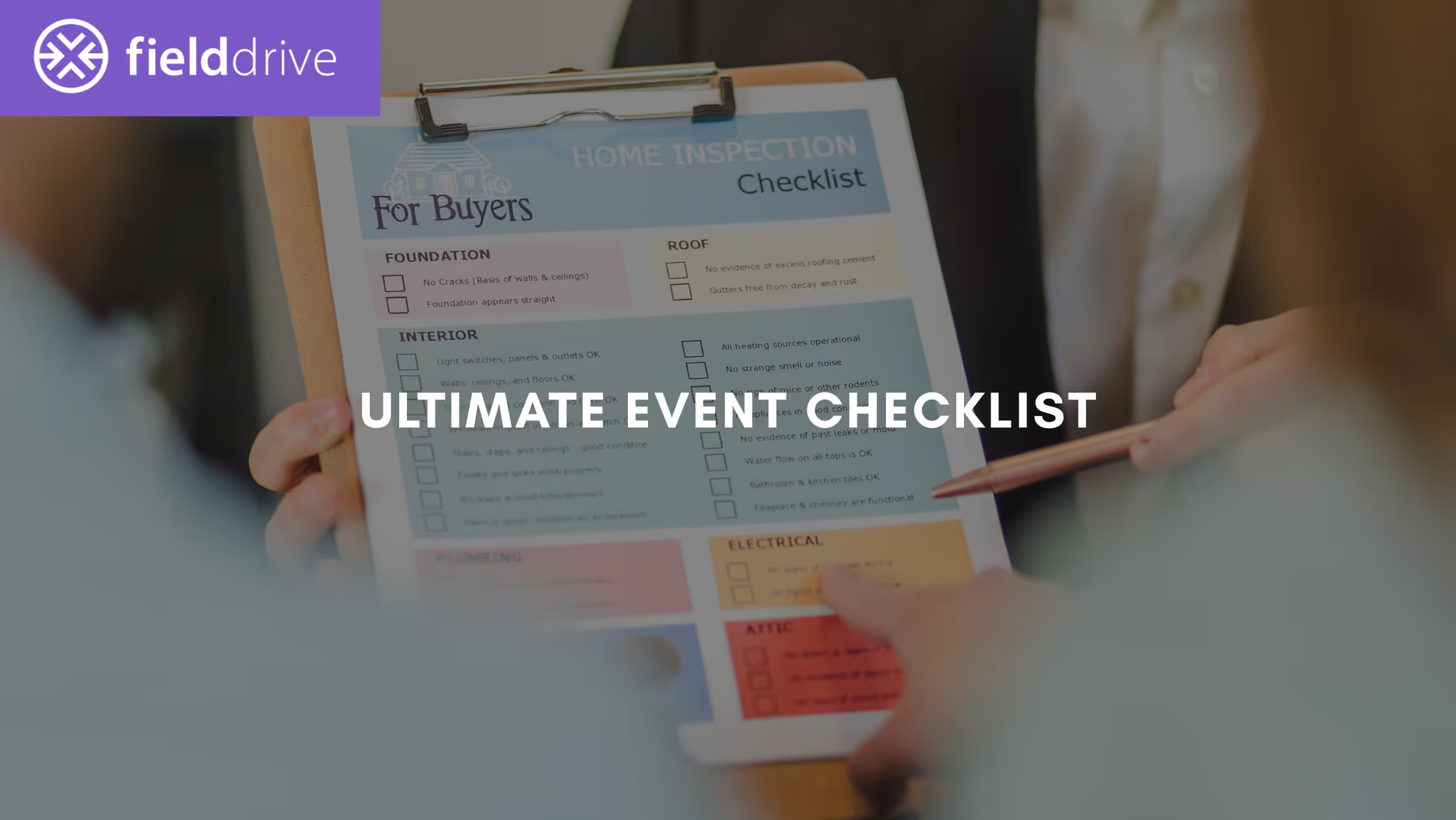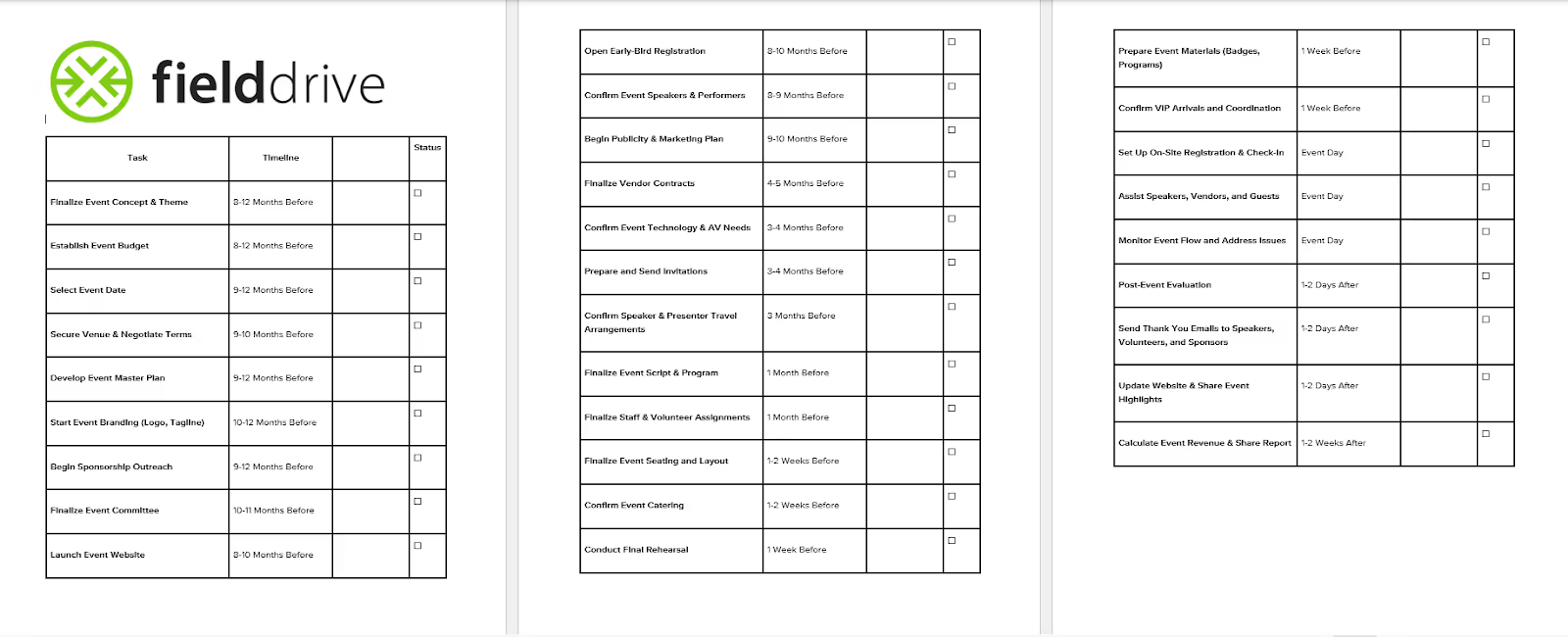Ultimate Event Checklist: Plan, Execute, Succeed (+ Downloadable Template)
New to event planning and not sure what to do first? Check out this post and discover the key steps to plan, execute, and succeed in your first event.

CONTENT
Planning an event can feel like juggling a thousand tasks at once. But what if you had a clear, step-by-step guide to ensure nothing slips through the cracks? That’s where an event planning checklist comes in—your blueprint to a smooth, stress-free event.
The global events industry was valued at $736.8 billion in 2021 and is projected to reach $2.5 trillion by 2035. This rapid growth highlights the importance of effective event planning. With the increasing demand for seamless events, having a well-structured checklist is essential to staying organized and meeting expectations.
An event-planning checklist isn’t just a list—it’s a strategic tool that keeps you on track and ensures nothing is overlooked.
In this guide, we’ll discuss how to create and use a comprehensive event planning checklist, examine its key components, and provide actionable tips for staying organized from start to finish. Let’s get started!
What is an Event Planning Checklist?
An event-planning checklist is a structured tool designed to keep everything in check, ensuring every task is accounted for, every deadline is met, and no detail is overlooked. It helps break down the event-planning process into manageable steps, providing clarity and keeping you organized from start to finish.
Whether you're coordinating a large conference or a small gathering, a checklist allows you to stay on track, avoid last-minute panic, and execute a smooth event.
What an Event Planning Checklist Includes:
- Task List: A detailed breakdown of all necessary tasks.
- Timelines: Deadlines for each task to ensure everything is completed on time.
- Priority Status: Marking tasks as high, medium, or low priority to focus on what’s most important.
- Assigned Responsibilities: Who’s in charge of each task to ensure accountability?
- Progress Tracking: Space to update the status of each task (e.g., pending, in progress, completed).
- Budget Allocation: A section to track costs and ensure the event stays within budget.
This checklist is your blueprint to staying organized, reducing stress, and ensuring a flawless event execution.
Benefits of Using an Event Planning Checklist
An event checklist lets you bring your vision to life, ensuring that your event is a success and a true representation of your business. Here’s how it helps:
- Keeps you organized, ensuring no task is overlooked or forgotten.
- Helps manage time effectively, so every moment counts and no deadline is missed.
- Reduces stress by breaking down the chaos into manageable steps.
- Strengthens communication by making sure everyone knows their responsibilities.
- Increases accountability, helping you track progress and stay on schedule.
- Gives you the flexibility to adjust when things don’t go as planned quickly.
- Keeps your budget in check, avoiding unnecessary expenses.
- Ensures every detail—from logistics to marketing—is covered for a seamless event.
- Provides a clear view of the entire event, making it easy to spot and fix gaps.
Steps to Plan a Successful Event
Event planning requires clear goals, smart organization, and attention to detail. Here are the key steps to ensure a smooth, successful event:
- Set Goals: Define the event’s purpose—networking, lead generation, brand visibility, etc.
- Know Your Audience: Tailor content and promotion to attract the right attendees.
- Set a Budget: Plan for all major expenses—venue, speakers, marketing, tech.
- Choose the Format: Decide between in-person, virtual, or hybrid based on goals and audience.
- Pick a Date & Venue: Choose a date that works and a space that fits your needs.
- Build a Schedule: Create a clear agenda with sessions, breaks, and activities.
- Book Speakers & Vendors: Secure relevant speakers, reliable vendors, and supportive sponsors.
- Promote It: Use social media, email, and other channels to boost registrations.
- Manage Logistics: Handle check-ins, setup, and technical needs smoothly.
- Engage Attendees: Encourage participation with apps, networking, and interactive elements.
- Post-Event Analysis: Gather feedback and review data to improve future events.

On the surface, these are the key steps in event planning, but we’ve broken them down into specific sections with timelines. This will help you understand exactly when to tackle each task, keeping everything organized and ensuring your event runs seamlessly.
Event Planning Checklist: Core Components with Timelines
Event planning requires timely execution of key steps to keep everything on track. Breaking the process into clear, manageable tasks with set deadlines helps prevent last-minute chaos and ensures a smooth event. Use the checklist below to stay organized and on schedule.
- 8 to 12 Months Before the Event
This is the crucial phase: laying the groundwork, establishing goals, and starting to secure key details to ensure a smooth event ahead.
- Establish Event Goals and Objectives
- Define the event’s core purpose (e.g., raise funds, increase awareness, foster networking).
- Set specific, measurable goals:
- How many attendees do you aim to attract?
- What key performance indicators (KPIs) will determine success (e.g., funds raised, media coverage)?
- Ensure alignment of event objectives with your organization’s overall mission.
- Select the Event Date
- Choose a date that avoids conflicts with local events or holidays.
- Confirm the availability of key participants (e.g., speakers, performers).
- Ensure the season suits the event format (e.g., outdoor events work best in summer).
- Start thinking about weather conditions and venue-specific needs (e.g., indoor vs outdoor).
- Identify and Secure a Venue
- Research and shortlist potential venues based on event size and audience.
- Confirm venue availability and get quotes for room rates, parking, and additional costs (AV equipment, Wi-Fi).
- Understand the venue's insurance and alcohol policies, along with any catering restrictions.
- Develop a Comprehensive Event Master Plan
- Draft a detailed project plan that outlines every task and milestone leading up to the event.
- Break down each task into manageable phases, assigning responsibilities.
- Set clear deadlines and ensure the event team understands their role in meeting them.
- Prepare for contingencies—anticipate potential issues and draft fallback solutions.
- Get Cost Estimates for Key Expenses
- Identify major cost areas:
- Venue rental
- Catering and food & beverage costs
- Speaker fees
- AV equipment
- Event staff travel and accommodation
- Get quotes from multiple suppliers and begin negotiations.
- Consider hidden costs (e.g., parking fees, insurance, service charges).
- Identify major cost areas:
- Create an Event Budget
- Compile cost estimates into a comprehensive budget.
- Allocate funds to each category (venue, catering, marketing, etc.).
- Set a contingency fund (typically 10-20% of the total budget) for unexpected expenses.
- Use budgeting software or spreadsheets to track and update regularly.
- Recruit an Event Planning Team
- Appoint an Event Manager/Chairperson and designate sub-committee heads (e.g., marketing, logistics, speakers).
- Define clear roles and responsibilities for each team member.
- Establish communication channels (e.g., email threads, shared documents, event management tools).
- Start Branding Your Event
- Develop a logo, tagline, and event branding guidelines (colors, fonts, style).
- Create branding elements that reflect the event’s goals (e.g., visually communicate the theme) and ensure consistency across all promotional materials
- Begin Developing an Event Website or Registration Page
- Start building the event website to include essential details (schedule, venue, registration).
- Optimize the website for mobile users (most attendees will access it via smartphones).
- Include early registration options and set up secure payment systems.
- Consider integrating social media share buttons to increase event visibility.
- Create a Publicity Plan and Launch Promotions
- Designate a team for media relations, VIP coordination, and printed materials.
- Begin promoting the event through email, social media, and paid ads.
- Establish a PR strategy—coordinate press releases, influencer outreach, and media partnerships.
- Plan for print collateral, like flyers, posters, and invitations.
- Identify and Secure Speakers/Presenters
- Finalize your speaker lineup and confirm their availability.
- Reach out to influencers, industry leaders, or celebrities who align with your event’s goals.
- Negotiate speaking fees, travel arrangements, and accommodation.
- Approach Sponsors/Partners for Support
- Research potential sponsors and approach them with tailored sponsorship packages.
- Define what sponsors will gain (branding exposure, leads, media mentions).
- Create a sponsorship proposal with clear benefits and opportunities for branding.
- Establish a timeline for sponsorship commitments and follow-ups.
- Evaluate the Need for Event Registration Software
- Assess whether event registration software is necessary for streamlining sign-ups, payments, and attendee management.
- Look for software that integrates with your event website, allowing easy attendee tracking.
- Ensure it can handle ticketing, confirmations, and event-related communication.
- Consider Event Management Software
- Evaluate event management platforms that offer multi-functionality.
- Choose software that can handle project management, event marketing, ticketing, and attendee engagement.
- Release Early-Bird Tickets to Build Interest
- Set up early-bird pricing to incentivize early sign-ups.
- Promote these tickets across your website, social media, and email campaigns.
- Use discounts to create a sense of urgency and drive ticket sales.

b) 3 to 4 Months Before the Event
As the event date approaches, it’s time to shift focus to execution, refine logistics, finalize vendor agreements, and kick off the promotion.
- Speaker, Presenter, and Entertainer Coordination
- Confirm presentation topics and get bios and photos from all speakers.
- Arrange travel and accommodations for speakers, entertainers, and key participants.
- Ensure contracts are signed where applicable (e.g., with speakers or performers).
- Encourage speakers to promote the event and share it with their networks.
- Venue and Logistics Coordination
- Confirm venue arrangements, including menu, AV equipment, parking, signage, and more.
- Assess accessibility requirements (e.g., wheelchair access, all-gender restrooms, and virtual accessibility).
- Check for necessary permits, licenses, and insurance required for the event.
- Publicity and Marketing Efforts
- Create event program draft and finalize event script (e.g., MC script, speaker introductions, closing remarks).
- Develop publicity materials, including newsletters, ads, and press releases.
- Prepare media kit materials, including speaker details, photos, and press releases.
- Create a Facebook event page and share event details on social media.
- Develop a promo video for the event and post it on platforms like YouTube and Facebook.
- Build Buzz and Engagement
- Register the event on online event calendars to increase visibility.
- Create buzz on blogs or member forums to engage your audience.
- Determine VIPs for invitations and track RSVPs and special arrangements.
c) 1 Month Prior to the Event: Finalizing Details
The push begins here—ensure all details are locked in, from content to logistics, and start communicating with attendees and speakers.
- Send Reminders and Finalize Registration
- Remind contacts about registration and event participation.
- Schedule email reminders leading up to the registration closing (one week, one day, and day-of).
- Promote registration through social media channels (adjust frequency based on platform/audience).
- Sponsorship Finalization
- Confirm sponsorships and finalize underwriting details.
- Request promotional materials from sponsors for event day.
- Encourage sponsors to promote the event on their own channels.
- Execute Publicity Plan
- Release press announcements for keynote speakers, celebrities, VIPs, etc.
- Distribute the initial event news release and additional details through your website and partners.
- Ticketing and Materials
- Close early-bird registration and switch to standard pricing.
- Finalize printed materials, ensuring everything is accurate (proofread for grammar, spelling, and brand consistency).
d) 1 Week Prior to the Event: The Home Stretch
With the event just around the corner, check that all tasks are on track and finalize all the remaining details to ensure nothing slips through the cracks.
- Confirm Details and Final Touches
- Review the Master Plan with committee chairs and ensure everything is in place.
- Develop backup plans for volunteers, registration, and event setups.
- Finalize Event Logistics
- Review and finalize the event script and assign practice sessions for speakers.
- Confirm seating arrangements, ensuring accessibility for all attendees.
- Provide final registration numbers to the caterer for an accurate food count.
- Final Checks
- Ensure all speeches, presentations, and videos are ready and available in both print and online formats.
- Do a final registration check, including name badges and the registration list.
- Coordinate Media and VIP Details
- Determine photo opportunities and interview times with key speakers and VIPs.
- Confirm media attendance and final details with reporters or press.
- Send Reminders to Attendees
- Send reminder emails to all registered attendees, including key event details, schedules, and any last-minute instructions.
e) 1 Day Before the Event: Almost There
In the final countdown, ensure all event materials are in place, teams are briefed, and last-minute adjustments are handled efficiently.
- On-Site Set-Up
- Ensure registration tables are set up with necessary materials like name badges, pens, and paper.
- Double-check all signage is correctly positioned around the venue.
- Confirm that the A/V equipment has been tested and is working properly.
- Ensure all promotional items and gifts are on-site and properly organized.
- Check outlets to make sure there are enough power sources for the event.
- Staff Coordination
- Brief volunteers and team members about their roles and timelines.
- Review final details with committee members to ensure alignment.
f) Event Day: The Show Time
The big day is here—your planning comes to life. Here’s what you need to ensure everything goes smoothly:
- Essential Materials and Contacts
- Have all important materials with you: directions, phone numbers, seating charts, guest lists, VIP parking permits, and keys.
- Team Coordination
- Check in with committee chairs to ensure all teams are aligned and on schedule.
- Touch base with catering and sponsor teams to ensure their preparations are on track.
- Support and Assistance
- Be available to assist sponsors, speakers, and other team members as needed. Make sure all their needs are addressed promptly.
- Welcome Attendees
- Greet new attendees as they arrive, ensuring they feel welcomed and prepared for a smooth check-in.
Ensure a seamless event day with fielddrive’s efficient check-in and badge printing solutions. Streamline on-site operations and create an unforgettable experience for your attendees.
g) Right After the Event: Post-Event Follow-Up
The event may be over, but your work isn’t done yet. Here’s what you need to focus on immediately after the event:
- Financial Wrap-Up
- Collect all receipts, documentation, and final registration data.
- Update the event budget and reconcile any expenses.
- Thank You Notes
- Send personalized thank-you letters to sponsors, volunteers, speakers, presenters, donors, and media outlets.
- Remind them of their contributions to the event’s success, such as funds raised or awareness generated.
- Post-Event Publicity
- Send out highlights via email to your subscriber base and include any notable outcomes from the event.
- Share event highlights on social media platforms.
- Update the event’s webpage to reflect that it’s a past event and keep it accessible for reference.
- Engagement and Future Plans
- Reach out to event participants to keep them engaged with your ongoing programs.
- Promote opportunities for them to join, volunteer, or donate to future efforts.
- Return Rentals
- Ensure all rented equipment and items are returned promptly to the respective vendors to avoid additional charges.
h) Post-Event Analysis
Once your event has wrapped up, it’s time to gather insights that will help you improve future events. Here’s what to focus on:
- Conduct a Post-Event Survey
- Ask attendees for feedback on what they enjoyed about the event.
- Identify areas for improvement by learning what attendees didn’t like or felt could be better.
- Thorough Event Evaluation
- Analyze the event’s successes and what could be improved next time.
- Reflect on whether you met your goals, objectives, and KPIs.
- Share Data with Stakeholders
- Provide a detailed analysis of the event’s performance to all key stakeholders involved.
- This includes the survey results, team feedback, and any actionable insights.
- Calculate Event ROI
- Assess the event’s return on investment.
- Determine how well the event performed financially.
Planning Events Checklist Downloadable Template

Revolutionize Your Event Management with fielddrive
Event planning requires a careful balance of preparation and execution. The key to success lies in staying organized, setting clear goals, and ensuring smooth communication between all parties involved.
While creativity and strategy are essential, on-site operations can often become a source of stress and complexity. Avoid unnecessary last-minute issues, long wait times, and attendee frustration by ensuring your event logistics are streamlined from the start.
That's where fielddrive comes in. With its innovative solutions, fielddrive transforms your event’s on-site operations, ensuring everything runs smoothly and efficiently. Key features of fielddrive:
- Self-Check-In: Fast, automated check-ins to reduce lines and boost satisfaction.
- On-Demand Badges: Print custom badges instantly for a smooth, professional experience.
- Real-Time Analytics: Track attendance and engagement live for smarter event decisions.
- Lead Retrieval: Easy lead capture for exhibitors to improve follow-ups and ROI.
- Seamless Integration: Syncs with your existing systems and CRMs effortlessly.
- Scalable Solutions: Flexible for any event size, from small meetings to large expos.
Book a demo with fielddrive today and see how our solutions can elevate your next event.
Want to learn how fielddrive can help you elevate your events?
Book a call with our experts today



.png)
.svg)
.svg)
.svg)

.svg)